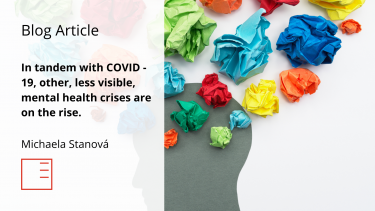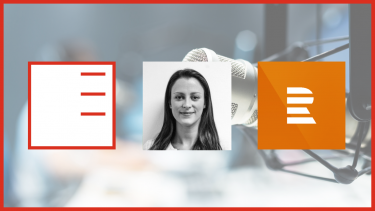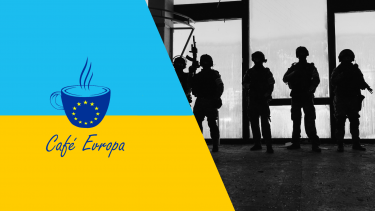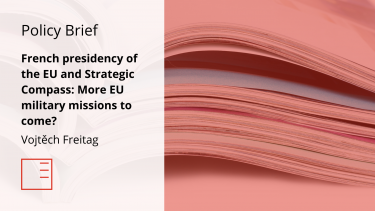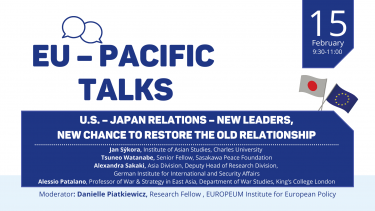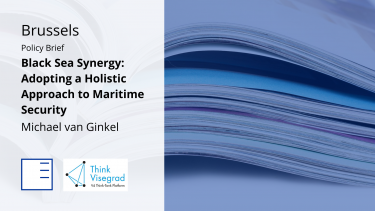Decarbonization of the Czech automotive industry
After the successful delivery of last year’s project focused on the decarbonization of the Czech automotive industry, the climate team of EUROPEUM Institute for European Policy leads its second round. This time, the project aims to use already acquired knowledge, contacts and resources to help create a conducive environment for discussion between the representatives of the industry and the public sector. It will also contribute to our understanding of the decarbonization pathways through evidence-based research. Lastly, the project aims to raise social awareness about the challenges and opportunities presented by the transition of the automotive industry by organizing events and media briefings. This year’s project will be shaped by the Czech Presidency of the European Council in the second half of the year.
Show more

Blog: In tandem with COVID - 19, other, less visible, mental health crises are on the rise.
Michaela Stanová has written a blog in which she discusses how the COVID-19 pandemic has affected the mental health of us all. She argues the emergence of COVID-19 has caused not only an increase in, but also an worsening of, pre-existing mental health problems, but fortunately also an interest in addressing them. This is both at the individual level and at the legislative level.
Show more PDFČRo Plus: Ukraine applies to join the European Union. Is its membership just wishful thinking or is it actually on the agenda?
Our researcher Jana Juzová spoke on Český Rozhlas Plus about Ukraine's application to the European Union, which was submitted last week. Ukrainian President Volodymyr Zelensky submitted the application, which was subsequently supported by European Commission President Ursula von der Leyen and the entire eastern wing of the Union. Is Ukraine's starting position problematic? How likely is it that candidate status will be granted? And which members are traditionally against the enlargement of the Union?
Show moreINVITATION: Café Evropa online: Russian aggression in Ukraine - can we stop Putin?
We would like to invite you to the next debate within the Café Evropa series, this time on the topic: " Café Evropa: Russian aggression in Ukraine - can we stop Putin?". The debate will take place on 2 March at 17:30. What will be the impact of the joint actions of the EU and NATO countries on Russia? Are the arms supplies sufficient or should direct military support be included? Can economic sanctions help Ukraine in any way now, or is this more of a step that will only become apparent in the longer term? Is the collapse of the rouble and the entire Russian market realistic? How can China influence Russia's current economic situation? And how will these sanctions be felt by the Russian population?
Show moreEURACTIV: You're either with us or against us. Serbia is gambling with its future in the EU
Our researcher Jana Juzová commented for Euractiv on how Serbia's ambiguous position is affecting its EU accession process. Serbia is one of the few European countries, that has refused to join the anti-Russian sanctions, even though it has supported Ukraine's territorial integrity and promised to help refugees. The role taken by this Western Balkan country is not surprising, as it has been teetering between the EU and Russia for the last decade. In the accession process, according to our researcher, Serbia's current position towards Russia is not the biggest problem, as Serbia also faces other shortcomings for EU integration.
Show morePOLICY BRIEF: French presidency of the EU and Strategic Compass: More EU military missions to come?
Our researcher Vojtěch Freitag, in his article "French presidency of the EU and Strategic Compass: More EU military missions to come?", writes about France and its presidency of the European Union. France has put forward its vision of the next year EU agenda with a strong emphasis on EU sovereignty.
Show more
INVITATION: EU-Pacific Talks: U.S. - Japan relations - new leaders, new chance to restore the old relationship
We would like to invite you to the fifth debate from the EU-Pacific talks series titled "U.S. - Japan relations - new leaders, new chance to restore the old relationship". The debate will take place online on the 15th of February and will be broadcasted on our Facebook page.
Show more
Policy Brief: Black Sea Synergy: Adopting a Holistic Approach to Maritime Security
As part of a study visit to the Brussels office of Think Visegrad, a publication by Michael van Ginkel was published, focusing on prosperity and security in the Black Sea region. The document provides an overview of the current situation in the region, possible threats, and ways to prevent them. The author of the paper recommends adopting a holistic approach to maritime security and describes priority areas that could benefit from increased synergies in the Black Sea region.
Show morePolicy Paper: Time to Redefine the Terms and Conditions of the Transatlantic Relationship? – 2021 Transatlantic Policy Forum in Review
On November 18-19, 2021, the fourth edition of the Transatlantic Policy Forum took place. It was hosted by EUROPEUM Institute for European Policy in partnership with the German Marshall Fund of the United States and the International Republican Institute (IRI), supported by the International Visegrad Fund, Friedrich Naumann Foundation, and the Ministry of Foreign Affairs of the Czech Republic. The aim of this Policy Paper is to provide a summary and analysis of the discussions that took place, while respecting the Chatham House rule and thus preserving the anonymity of the participants. This analysis aims to highlight and elaborate on the main findings of the participants.
Show more
Policy Paper: Czech-Russian Escalation as a Case of Deeper EU-Russia Crisis: Time for a United and Credible Action
Pavel Havlíček, an analyst at the AMO Research Centre, has written a policy paper for our Brussels office on the Czech-Russian escalation as a case of a deeper crisis between the EU and Russia. In his article, he also makes recommendations for the European Union. The text was written during a research stay in Brussels, which was facilitated by our Brussels office with the support of the Ministry of Foreign Affairs of the Czech Republic.
Show more PDFStaroměstské náměstí 4/1
Prague 1 - Staré Město
110 00
tel.: +420 212 246 552
email: europeum@europeum.org
https://www.europeum.org

